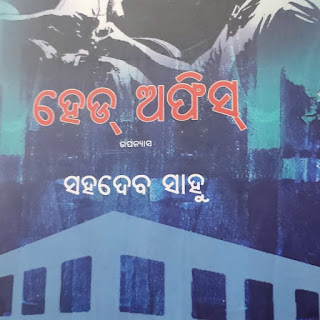(I am sitting at three from right, Goura Mahapatra is left to me. The photo was taken on the day I handed over charges)
I reached the office every day at ten; the office
staffs of Patnagarh were also punctual. Goura Mohapatra was the senior clerk, a
sincere and dependable man. He was well versed in treasury code. I did not have any difficulty in managing the treasury. Most of the
pensioners drawing pension from the treasury were fourth class employees,
retired clerks or teachers. Patnagarh was a princely state; it was integrated
with Odisha after independence. Patnagarh or Bolangir district being ruled by
the king were not that developed, did not have many officers like in coastal
districts such as Cuttack, Puri or Balasore had.
That was perhaps first or second day of the month; the
bank employees were on strike. We did not attend to the pension bills since
they could not get payment as the bank was closed. I was relaxing and reading a novel. Five
or six old people intruded into my room and requested, “Pay pension to us, we
don’t have money.”
I explained, “I shall pass the bills, but the bank
will not pay. Bankers are on strike. Come tomorrow.”
One of them said, “How can we return?”
I could not get it. They might have come by bus and
also would return by bus. The buses were not on strike along with the bankers.
Goura Mohapatra was in my room. I looked at him. He said, “Sir, they must have
spent their pension by the end of the month. They might have come by burrowing
one side of the bus fare. When they get pension, they make purchases of grocery
goods for a fortnight or a month and return home. They are habitual drinkers and
might have exhausted their pension even before end of the month; they might not
have money for the return bus fare.” Then he told them, “What can Sir do? The
bank is closed. Go back, come tomorrow.”
They did not move, stood silently before me. I took one
hundred rupees from my wallet, gave to them and said, “Take your return bus
fare, and come tomorrow. You cannot get pension today.”
They returned happily and the next day, they collected
my hundred rupees and paid me back.
One day, after this incident, I was in the Sub
Collector’s room chatting with him. Ambika Prasad Misra was the sub collector,
an amiable and friendly person. I had passed the pension bills and also
finished the day’s work. I had just dropped in Sub Collector’s room on my way
back to my res. The Director of Treasuries reached suddenly, on a surprise
inspection. He had been on Kalahandi tour and entered in our treasury en route
back to Bhubaneswar. Found me absent, he got irritated and thought, being
Patnagarh far away from Bhubaneswar, I might not be sincere and would have
remained absent without application.
Goura Mohapatra told him the treasury officer was with
the Sub Collector, but he did not listen to him. Some pensioners were there in
front of the treasury. He asked them, “Are you getting pension regularly in
time or having some trouble? Does the treasury officer come to the office every
day?”
The pensioners present there told him, “Sir, the
treasury officer is a godly person. We are old people, but he looks after us
like his children, sometimes, helps us with money. We regard him like we respect
our parents.”
I came from the Sub Collector’s office. The pensioners who were somewhere near, when
heard a big officer, senior to the treasury officer from Bhubaneswar had come
and inquiring about the treasury officer, gathered and encircled the Director.
One of them said, “Sir, we had never seen such an officer, so good and caring,
not seen even when we were in service.”
Later, after the Director left Mr Mohapatra recounted
the incident and what the pensioners spoke on me. Mohapatra was pleased. Praise
for the officer also meant the treasury functioned well having no complaints. Only
once I had given a few of them one hundred rupees which they had also returned
the next day.
The Director went to my office room. The pensioners had left. In the mean time, Mohapatra had arranged sweets
and tea for the Director. The peon served. The Director said, “Having spent some
minutes with the pensioners and talking to them I no longer have any appetite,
what more can I eat?”
The district treasury officer inspected the sub
treasuries under his jurisdiction once in a year. One day after the surprise
visit of the Director I asked Mr Purnachandra Babu, the district treasury
officer, “Sir, when will you visit our treasury?”
He replied, “The Director told me, I am also hearing.
I think there is no need of inspecting your office.”
*****


















